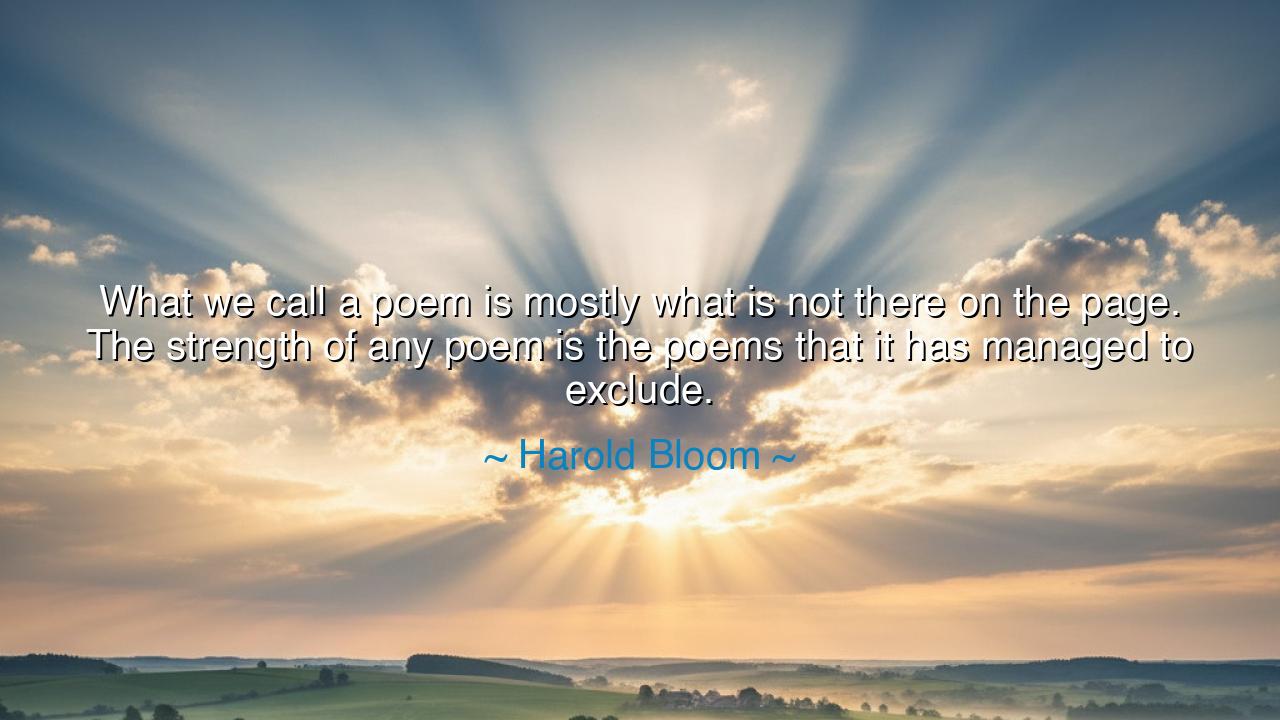
What we call a poem is mostly what is not there on the page. The
What we call a poem is mostly what is not there on the page. The strength of any poem is the poems that it has managed to exclude.






Hear the mysterious words of Harold Bloom, sage of letters: “What we call a poem is mostly what is not there on the page. The strength of any poem is the poems that it has managed to exclude.” These words ring like a riddle, yet they reveal a truth deeper than ink. For a poem is not only what is written—it is also what is withheld, what is restrained, what is suggested but not spoken. Its strength lies not in the flood of words, but in the discipline of silence, in the shaping of absence, in the meanings that echo beyond the page.
The ancients knew this well. The Greek tragedians, in their dramas, left much unseen and unspoken. The violence of Oedipus, the murder in Agamemnon’s house—these were not shown on the stage but were instead conveyed through words, gestures, and silence. And in that restraint, the imagination of the audience was awakened, filling the unseen with dread and awe. Here is Bloom’s wisdom: the strength of art lies not in excess, but in exclusion, in the clarity that comes when all that is unnecessary has been cut away.
Consider also the haiku of Japan, so brief, yet so vast. Seventeen syllables, no more—and yet within them the seasons turn, the mountains rise, and eternity breathes. Why? Because the poet does not attempt to say everything, but allows the unsaid to live between the lines. The silence becomes part of the poem; the absence speaks as loudly as the words. Thus the poem’s strength is in what is excluded, for the excluded becomes the infinite space into which the reader’s soul may wander.
History offers a lesson in this beyond poetry itself. Think of Abraham Lincoln’s Gettysburg Address, a speech of mere minutes, yet immortal. Its power lies not in what was said, but in all that was left unsaid—the unspeakable grief, the blood of thousands, the weight of history itself. By excluding excess, Lincoln gave the people words that lived beyond the battlefield, words that could be filled with their own sorrow, their own hope. So too with the poet: the power is not in the multitude of words, but in the space that allows the heart of the reader to enter.
Understand then, O seeker, that creation is not only addition—it is also subtraction. To create well is to decide what to exclude, what not to say, what not to reveal. The artist, the leader, the teacher—each must learn this art of restraint. For too many words obscure meaning, too many actions confuse purpose, too many desires scatter the will. The strength of the poem, like the strength of the soul, is in what it casts aside, in the purity of what remains.
Let this be your lesson: in your speech, let your words be few, but let them be chosen with care. In your life, let your pursuits be simple, but let them be worthy. Do not fill every silence with noise, nor every page with ink. Learn to hold back, to exclude, to refine, until what remains carries weight beyond measure. For just as the blank spaces on the page give the poem its shape, so do the silences of your life give your actions their meaning.
Therefore, take action. When you write, when you speak, when you live—ask yourself not only what to include, but what to exclude. Protect the silences, for they are holy. Leave space for others to see, to imagine, to breathe. In this way, your life itself may become a kind of poem, strong not by the clamor of excess, but by the clarity of what remains.
Thus is the teaching of Harold Bloom: the poem is not only the words upon the page, but the vastness of what is left unsaid. And in that restraint, in that discipline, lies its strength—a strength that mirrors life itself, where wisdom is found not in possessing all things, but in knowing what to let go.






AAdministratorAdministrator
Welcome, honored guests. Please leave a comment, we will respond soon